Where We Work
Click on our interactive map to find out more about the countries where we operate
Afghanistan
Population: 36,373,176
Capital: Kabul
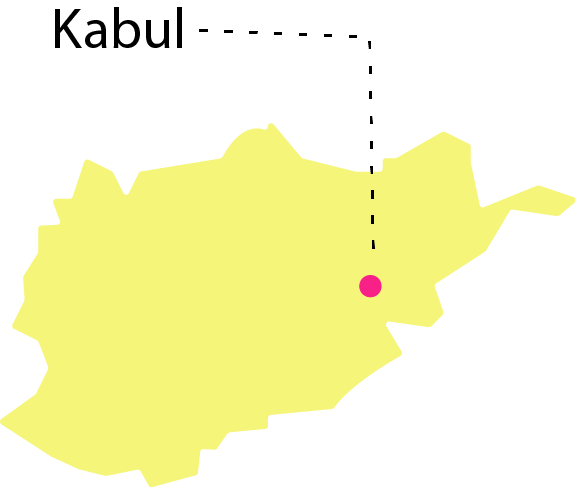
The collapse of the Taliban regime in 2001 and the Presidential and Parliamentary elections of 2004 and 2005 raised great hopes among the people of Afghanistan and the international community. A peaceful, democratic and stable country after nearly three decades of war seemed possible. However, a peace process with the Taliban has not yet materialized. Despite continuous attempts to negotiate for peace from both international organisations and National Unity Government (NUG), armed conflict with Taliban forces intensified throughout 2017. Attacks by the Islamic State (ISIS) have added to the insecurity experienced by most Afghans today.
Women’s rights continue to be threatened. In Afghanistan, the 2009 Elimination of Violence Against Women Law (EVAW law) was enforced in 2009 according to international treaty standards, criminalizing violence such as rape, and child and forced marriages. Due to opposition posed by more conservative members of parliament, the EVAW law was briefly removed in 2017, only to later to be included back into the penal code in February 2018. Despite its legal status, there remains minimal implementation on the ground, and police reports of violence against women remain low despite widespread perpetration.
N-Peace have been providing support to the government of Afghanistan on implementing the United Nations Security Council Resolution (UNSCR) 1325. In 2012, N-Peace supported two national dialogues on Women, Peace & Security (WPS) issues, including women’s inclusion in Afghanistan’s peace process, and providing opportunities for women to interact with Members of Parliament, CSO representatives, members of the High Peace Council, and women representatives of the Provincial Peace Councils from some of the most conflict-ridden parts of the country.
N-Peace has also assisted in the WPS national dialogues on UNSCR National Action Plans launched in June 2015, in which a commitment by the government was secured to ensure women’s inclusion in governance and development. N-Peace facilitated in the initiative by organizing cross-country knowledge sharing, and leveraging the experiences of N-Peace network members who have led the development of National Action Plans on UNSCR 1325 & 1820 in other countries in Asia.
**Information from 2017 Human Rights Watch Country Report and LSE blog
Indonesia
Population: 266,794,980
Capital: Jakarta
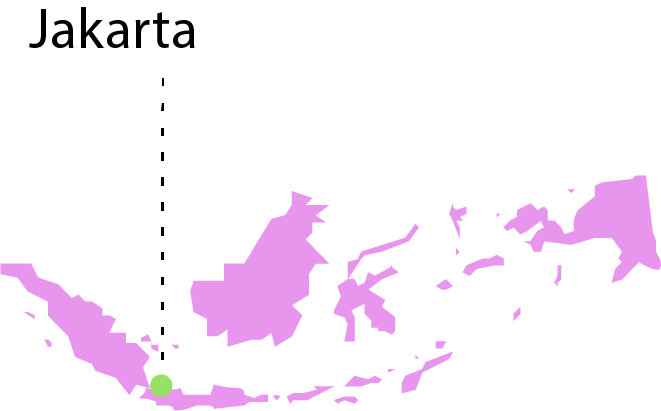
With over 75 ethnic groups across the archipelago of over 17,000 islands, Indonesia has experienced multiple subnational communal violent conflicts. Major struggles include Papua (Papua and West Papua Provinces), East Timor (now Timor-Leste) and Aceh, with the latter resulting in a historic peace agreement between the Gerakan Aceh Merdeka (GAM, the Free Aceh Movement) and the government in August 2005. Other regions affected by internal conflict and communal violence include Maluku and North Maluku, Central Sulawesi, West and Central Kalimantan and the capital City of Jakarta. Major terrorist attacks in recent years have been reported, often connected to the extremist groups Darul Islam and Jemaah Islamiyah.
From 2010-2012, the Women, Peace & Security (WPS) agenda had been the focus of the N-Peace activities in Indonesia, convening consultations to help create a National Action Plan (NAP) on UNSCR 1325 and playing a critical role in ensuring CSO voices and inputs were made. In 2016, N-Peace release a publication The Hidden Pearls, highlighting the important role women play ending hostilities and sustaining peace.
Most recently, religious disparities have been a cause of violence, including the oppression of religious minorities and threats from militant Islamists. In a landmark ruling in November, 2017, the Constitutional Court dismissed a law that had previously prohibited followers of native faiths to list their religion on identification cards. Though this ruling was a first step towards protecting followers of some 240 different religions in Indonesia, further measures to protect the freedom of religion is necessary. N-Peace has played an integral part in supporting activists of peace and women’s rights in countering political and socio-religiously motivated violent extremism, religious strife, and communal violence. Through supporting interfaith dialogues and community discourse, the call for religious tolerance and diversity has been gaining momentum.
Myanmar
Population: 53,387,948
Capital: Naypyidaw
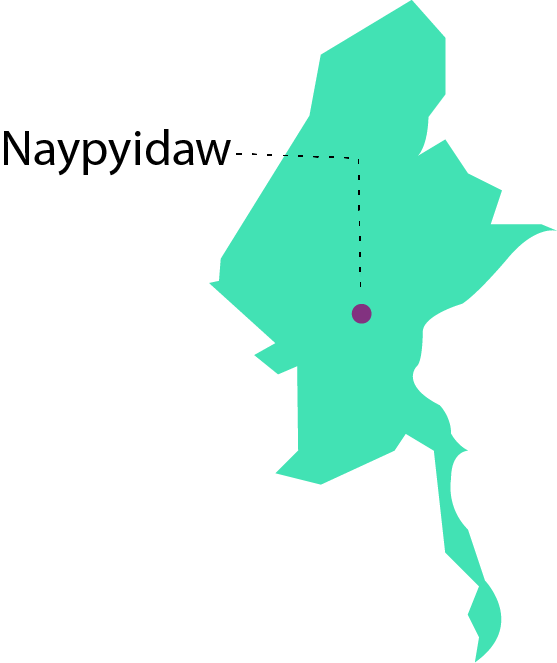
Like all situations of conflict, violence in Myanmar has resulted in detrimental and differentiated impacts on the rights of women and girls. Sexual violence against women is a 'signficant challnge in Myanmmar. In addition to physical abuse, killings, forced militant recruitment, landmine accidents, loss of livelihoods, and displacement. Women still have a very limited voice in the current peace process.
In 2013 the Myanmar National Committee for Women’s Affairs introduced a National Strategic Plan for the Advancement of Women (2013-2022). The strategy is based on the priority areas of the Beijing Platform for Action as well the principles of the Convention on the Elimination of All Forms of Discrimination Against Women (CEDAW), which Myanmar is party to.
On October 15th 2015, the Government of Myanmar (GoM) and eight Ethnic Armed Organizations (EAOs) signed a Nationwide Ceasefire Agreement (NCA) signaling the start of a new effort for political dialogue to end the country’s armed conflict. The NCA set-up a Joint Ceasefire Monitoring Committee (JMC) to implement provisions of the NCA, and a Union Peace Dialogue Joint Committee (UPDJC) to prompt political dialogue leading to a peace settlement.
Since this agreement, women are still fighting for equal representation in decision-making at all levels of the peacebuilding process. To-date, women have been largely absent from the formal structures of the peace process. While the NCA includes a provision for a ‘reasonable number’ of women representatives in the peace process, civil society organizations and networks are advocating for a minimum 30% quota of women’s representation in all formal structures. Women’s activists and organizations in Myanmar play an increasingly active role in ensuring that women’s experiences and expertise are included in peacebuilding processes.
Despite the positive steps Myanmar has taken, the government has yet to develop a National Action Plan on resolution 1325, the founding resolution of the women, peace and security (WPS) agenda. The country also ranks 83 out of 144 countries on the World Economic Forum’s 2017 Global Gender Gap Index. It is expected that as Myanmar continues to transition into away from military rule and towards democracy, more provisions towards WPS and the rights of women and girls will be introduced.
Nepal
Population: 29,384,297
Capital: Kathmandu
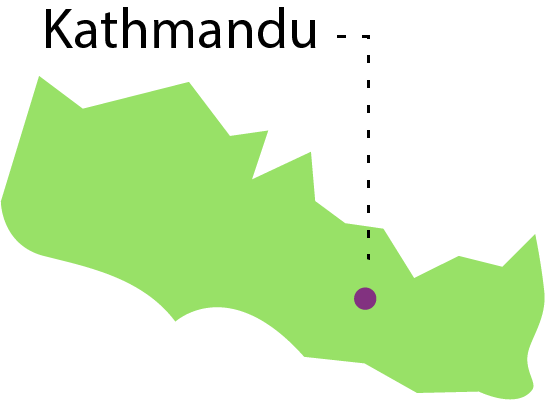
The Nepalese armed conflict between the government of Nepal and the Communist Party of Nepal (Maoist) spanned from 1996 to 2006. Nepal has a diverse population with 125 different ethnic or caste groups and approximately 123 languages spoken in the country. This armed conflict was marred with class divisions and ethnic disputes over land and resources.
According to the Gender Equality and Social Inclusion Index (GESI), in Nepal, women are most affected by poverty, natural disasters and class divisions, and experience high rates of gender based and sexual violence. Women make up 33% of House of Representatives, 35% of Provincial Assemblies and 41% of local government representatives. UN Women study on participation of women in peace processes found that even though two Nepalese peace agreements included issues such as gender based violence and sexual violence during the armed conflict , none of the signatories of the peace agreements were women, effectively excluding women from the peace process. Various gendered aspect of the conflict include the many conflict widows and their children who lack of citizenship documents, and the low levels of legal action being taken to respond to gender-based violence crimes committed during the armed conflict. . In addition to the armed conflict, the other forms of discrimination such as “Chhaupadi” (or the practice of banishing menstruating women from the family home) is still widespread despite of various efforts from Government to address the issue. The Nepalese government made it illegal for anyone to force a menstruating woman or girl to sequester herself in 2017, with violators subject to jail time or fines, the law was effective from 17 August. Even though child marriage is illegal in Nepal, 37% of girls under the age of 18 are married, according to a Human Rights Watch Report. Prevailing persistent issues include lack of legal protection for female headed households, stigmatisation of Dalit women on the basis of caste, mass human trafficking, and violence against women.
Peacebuilding in Nepal, as a country frequently at the centre of natural disasters, presents many challenges, yet progress is being made. In 2015, Nepal adopted a new Constitution which included the concept of equality among all persons. Though this is a positive step towards peacebuilding, ending the deeply entrenched cast system, the ‘lesser’ legal status of women, and the remnants of conflict and disaster. Yet in April 2015, an earthquake struck many poor and conflict-affected communities, killing 9,000 people and injuring 22,000. According to a study released by Georgetown University, 73% of women reported a lack of access to shelter, clean water and sanitation after the earthquake; with another 49% stating that the decrease in security led to more instances of sexual violence and harassment.
Pakistan
Population: 197,015,955
Capital: Islamabad
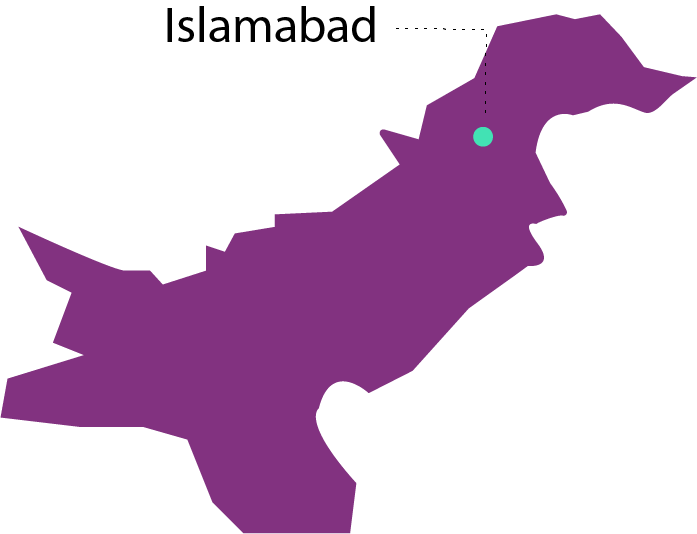
The global “war on terror” had a devastating impact on peace, security, and stability in Pakistan. Decades of conflict at local, national, and regional levels have exacerbated poverty, social exclusion, violent extremism, and significantly contributed to increased discrimination and violence against women. In 2017, Pakistan was ranked 143 out of 144 countries on the World Economic Forum’s Global Gender Gap Index.
One of the biggest challenges facing women and girls in Pakistan are deeply entrenched traditional and religious attitudes that seek to limit the types of roles that women can have in society. Devolution has exacerbated this problem by enabling religious and tribal communities to have more authority over women’s rights, rather than democratically elected members of government. These traditional attitudes have made honour killings, violence against women, and domestic violence an unfortunate regularity in the lives of many women in Pakistan.
Child marriage is also a significant issue preventing girls and women from actualizing their human rights in Pakistan. A 2017 Gallup poll found that approximately 1 in 4 (24.7%) women in Pakistan were married before the age of 18, with 6% of those girls marrying before the age of 16. Attempts by policy and lawmakers to amend the legal age of marriage in Pakistan has been met with staunch criticism. An amendment to the Child Marriage Restraint Bill, which would have increased the legal age of marriage from 16 to 18 years old, was struck down by Pakistan’s Senate in October 2017 after criticisms that it was “un-Islamic”. There is hope that pressure from government officials and members of civil society will bring the bill back to the table.
The proliferation of violent extremism in Pakistan also stands as a major threat to women’s rights. This includes but is not limited to their ability to move freely, have freedom of expression, and break out of traditional gender roles. This is especially true in areas like Khyber Pakhtunkhwa Province. Minority groups in this area such as the Hazara community have experienced escalating terrorist attacks this year, religiously motivated violence against women has surged and clashes with militant groups have resulted in increased bombings, disappearances and extrajudicial killings in areas like Baluchistan.
There is an expectation that efforts from women’s civil society groups will result in an rise in the number of women who will be elected during the 2018 Pakistani general elections. An increase in women’s political participation will likely result in the development of more legal provisions which protect women’s rights as well as pressure to develop a National Action Plan for the implementation of resolution 1325 of the Women, Peace and Security (WPS) Agenda.
Sri Lanka
Population: 20,277,597
Capital: Sri Jayawardenapura Kotte
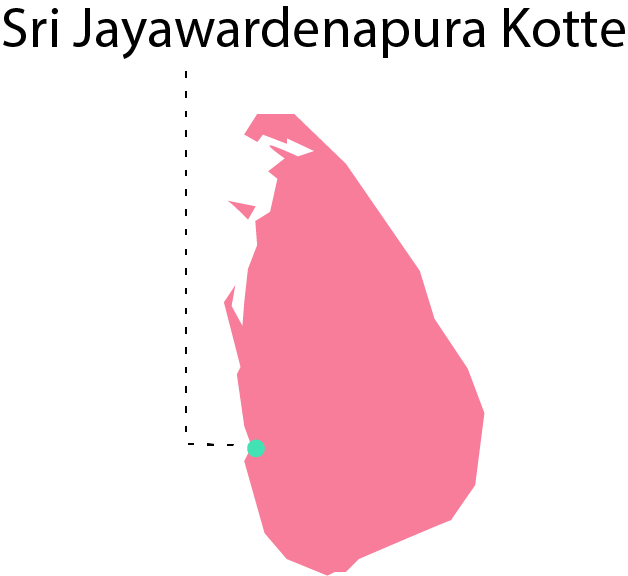
Between 1983 and 2009, Sri Lanka went through 25 years of civil war in which between 80,000 to 10,000 people were killed. Motivating factors in this conflict between the government and the Militant group the ‘Liberation Tigers of Tamil Eelam’ included the unequal treatment of various minority groups on the basis of ethnicity and religion.
Sri Lanka is in a tenuous phase of its peacebuilding process; with help from the United Nations, Sri Lanka is rebuilding its institutions. Nevertheless, the National Action Plan for human rights remains largely unimplemented. In 2009, the Security Council expressed concern with regards to the security of civilians in Northern and Eastern parts Sri Lanka. According to official statistics released by the Ministry of Women and Child Welfare, approximately 89 000 women were left widowed by the war – of these, 49 000 were in the Northern Province and 40 000 in the Eastern Province. Furthermore a study by the Ministry in 2015 states that women-headed households accounted for 23.4% of the Sri Lanka’s population.
The Office of the High Commissioner for Human Rights has also expressed concern for the lack of institutional justice in the country, particularly in a Report published in 2015, and again in a Report submitted in 2017. These concerns regard the lack of access to politics, justice, and resources for the most marginalised in society – with impetus on women. The security of women in war-affected areas in Sri Lanka also continues to raise concern, with high incidents of sexual violence.
Though the Constitution enacted in 2015 allows for equal rights for women, many minority groups - especially women-members of these minority groups - bear the brunt of human rights violations such as trafficking, gender-based violence, and many perpetrators of human rights violations against women escape legal action.
Some key achievements were noted however in 2016 - such as the completion of consultations on transitional justice mechanisms, and the ratification of the International Convention for the Protection of All Persons from Enforced Disappearance. A quota to ensure 25% representation from the national list for local government was reserved for women candidates was also passed in an attempt to increase women’s political participation at local and national levels in Sri Lanka, which unfortunately continues to remain one of the lowest in South Asia.
Philippines
Population: 104,918,090
Capital: Manila
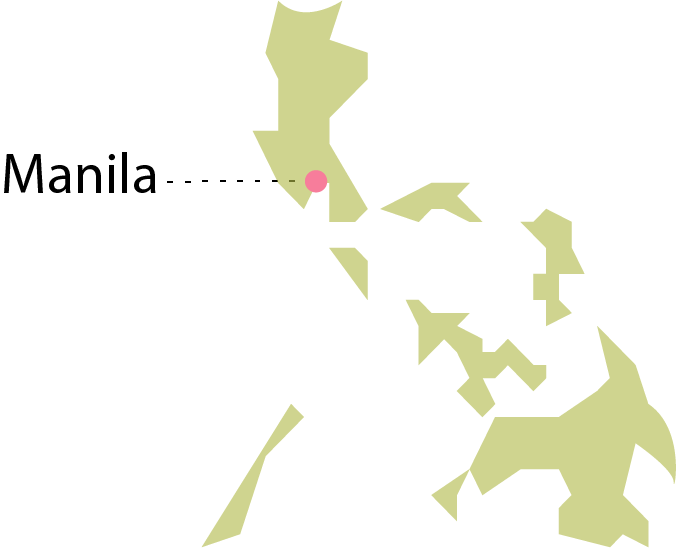
Women in the Philippines have historically enjoyed greater equality than many in the Asia-Pacific region. The country ranks 10 out of 144 countries in the World Economic Forum’s Global Gender Gap Index - the only country in this region to secure a spot in the top 45 countries. The Philippines experiences high levels of women’s political participation with two ex-presidents being female, as well as strong representation at regional and local levels. The government of the Philippines has also been proactive in its local implementation of international human rights laws pertaining to gender equality. In 2009 the government introduced the Magna Carta for Women which legally enshrines the human rights of women and seeks to eliminate gender-based discrimination through the recognition, protection, fulfillment and promotion of women’s rights.
Despite this strong track record, decades of armed conflict in the Mindanao region of the Philippines have negatively impacted the rights of marginalized groups, most of all women. Mindanao is the second largest island in the Philippines and is comprised of persons with extremely diverse ethnic and religious backgrounds. Of these groups, the Moro, or Muslim, population have long fought for independence and autonomy from the Catholic-majority Philippine central government. This tension has made Mindanao a regular site of conflict due to issues of social exclusion including land and resource dispossession, unequal access to basic services, and poor law enforcement. During the conflict in Mindanao, women experienced a regression in their rights as well as restrictive gender roles. Many women became exposed to gender-based violence, sexual slavery and trafficking.
In 2014, after years of deliberations and negotiations, the Bangsamoro Peace agreement was signed between the Government of the Philippines and the Moro Islamic Liberation Front (MILF). The agreement has been heralded as a success in its inclusion of women. Eight of the 16 provisions include mechanisms for engaging women in peacebuilding efforts and the head of the government negotiating team, Miriam Coronel Ferrer, became the first woman to be a signatory of a major peace agreement. The Philippines has emerged as a regional leader in its implementation of the Women, Peace and Security (WPS) Agenda. It is the first country in Asia to launch a National Action Plan (NAP) on UNSCR 1325, the founding resolution of the WPS agenda. This provided a much-needed entry point for women impacted by the conflict to address their grievances and challenges.
From 2017-2022, the NAP aims to implement UN Security Council Resolutions 1325 and 1820 and further expand women’s roles in the peacebuilding process. The Philippine NAP-WPS for 2017-2022 demonstrates the following enhanced features: (1) adoption of broader framing of addressing the situation of women in armed conflicts and recognition of their contributions to peacebuilding; (2) framing of women, peace and security issues from a human rights perspective; (3) participation and leadership of women in all levels of peace processes; (4) prioritization of conflict prevention and strengthening of mechanisms for the protection of women; and (5) multi-level implementation, monitoring and evaluation.
While the Philippines has made great progress on launching a NAP, there remains significant challenges in practically implementing UNSCR 1325 at all levels of society and government, especially in the face of tensions between violent extremists and the Philippines government. Despite the signing of the peace agreement in 2014, tensions continue in the Mindanao region most recent of which includes the Marawi Incident in 2017, attributed to the Islamic State.
In July 2018, the peace process between the Philippine Government and the Moro Islamic Liberation Front witnessed a historic milestone with the signing of the Organic Law for the Bangsamoro Autonomous Region in Muslim Mindanao. The Bangsamoro Organic Law (BOL) envisions the establishment of an autonomous political entity that will seek to address Muslim Filipinos’ right to self-determination and identity as well as issues on historical injustice, resource and power sharing, and free exercise of religion and culture. Furthermore, the BOL also puts forth specific provisions relative to the protection of the fundamental rights of women; the representation of women in decision-making and policy-determining bodies; and, the critical role of women in governance, rehabilitation and development in the Bangsamoro autonomous region.
"The designations employed and the presentation of material on this map do not imply the expression of any opinion whatsoever on the part of the Secretariat of the United Nations or UNDP concerning the legal status of any country, territory, city or area or its authorities, or concerning the delimitation of its frontiers or boundaries and is for illustrative purposes only."